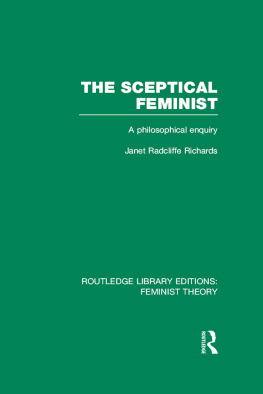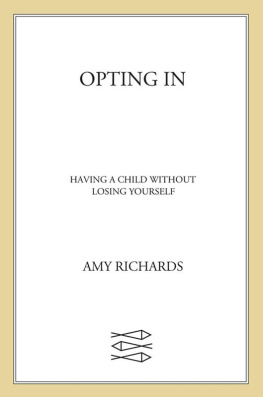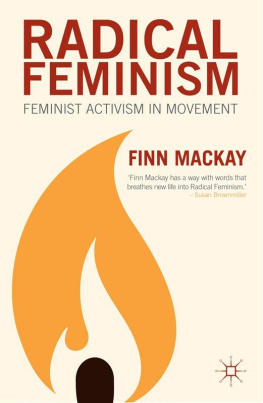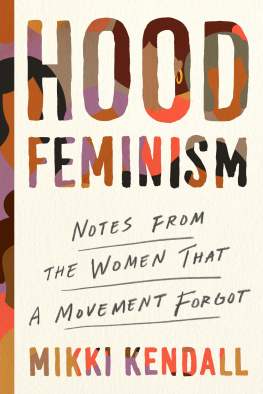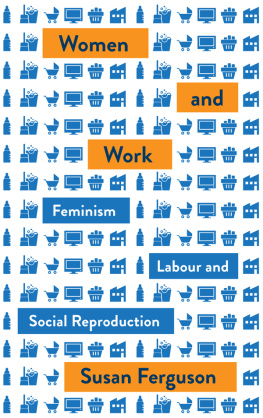ROUTLEDGE LIBRARY EDITIONS:
FEMINIST THEORY
THE SCEPTICAL FEMINIST
First published in 1980
This edition first published in 2013
by Routledge
2 Park Square, Milton Park, Abingdon, Oxon, OX14 4RN
Simultaneously published in the USA and Canada
by Routledge
711 Third Avenue, New York, NY 10017
Routledge is an imprint of the Taylor & Francis Group, an informa business
1980 Janet Radcliffe Richards
All rights reserved. No part of this book may be reprinted or reproduced or utilised in any form or by any electronic, mechanical, or other means, now known or hereafter invented, including photocopying and recording, or in any information storage or retrieval system, without permission in writing from the publishers.
Trademark notice: Product or corporate names may be trademarks or registered trademarks, and are used only for identification and explanation without intent to infringe.
British Library Cataloguing in Publication Data
A catalogue record for this book is available from the British Library
ISBN: 978-0-415-53401-7 (Set)
eISBN: 978-0-203-08796-1 (Set)
ISBN: 978-0-415-63706-0 (Volume 31)
eISBN: 978-0-203-08482-3 (Volume 31)
Publisher's Note
The publisher has gone to great lengths to ensure the quality of this reprint but points out that some imperfections in the original copies may be apparent.
Disclaimer
The publisher has made every effort to trace copyright holders and would welcome correspondence from those they have been unable to trace.
THE SCEPTICAL FEMINIST
First published in 1980
by Routledge & Kegan Paul Ltd
39 Store Street, London WC1E 7DD,
9 Park Street, Boston, Mass. 02108, USA and
Broadway House, Newtown Road,
Henley-on-Thames, Oxon RG9 1EN
Set in 10/12 Linotron Garamond by
Input Typesetting Ltd
London
and printed in Great Britain by
Redwood Burn Ltd
Trowbridge & Esher
Janet Radcliffe Richards 1980
No part of this book may be reproduced in
any form without permission from the
publisher, except for the quotation of brief
passages in criticism
British Library Cataloguing in Publication Data
Richards, Janet Radcliffe
The sceptical feminist.
1. Feminism
I. Title
301.41'2 HQ1154 80-40879
ISBN 0 7100 0673 X
For Nancy Radcliffe Richards and Dudley Richards
Contents
Acknowledgments
One of the many ways in which this book departs from much recent feminist tradition is that it cannot be said to derive from a group of women which was its inspiration and the origin of most of its ideas. I am afraid that it was men who instigated it, and the work has been very largely solitary. However, there are several people to whom I owe a great deal.
The principal of these is Ted Honderich, without whom the book would never have been thought of, started or finished; who read the first and last of the many drafts, prevented near disaster at a couple of points by drawing my attention to important parts of the philosophical literature, and was the cause of my sharpening several arguments.
I am also very grateful to Neil Sanders for endless support and encouragement throughout its writing.
Several friends have read and commented on various parts of the manuscript at various stages. Carol Lee has given particularly valuable help, and has also supplied me with very useful anecdotes and quotations. Many thanks are owed to her, as well as to Yvonne Reynolds and my sister, Judith Jensen.
Various people have been very helpful in discussion, but most valuable of all have been the members of my 1978-9 Philosophy and Feminism class at the City University, London: Tany Paterson Alexander, Bobby Baker, Diana Cook, Isobel Cox, Betzy Dinesen, Kate Flannery, Bernadette Wrenn Hill and Kay Symons. I am particularly grateful to Betzy, who also took on the arduous job of helping me with the proofs. The evenings spent with this group have been splendid. Apart from improving the book a good deal they have brought it away from the pages and into reality by showing what a group of women can be like; a thing which most people have as yet had no chance to see, and as unlike the popular caricatures of groups of housewives or groups of feminists as can be imagined. If these are the women of the future, the future cannot come too soon.
a considering man may very well question the truth of those very suppositions which chymists as well as peripateticks, without proving, take for granted; and upon which depends the validity of the inferences they draw from their experiments . which though a chymist perhaps will not, yet I do, look upon as the most important, as well as difficult, part of my task.
Robert Boyle
The Sceptical Chymist 1661
Introduction
This book is a battle on two fronts. On the one hand, it takes strong issue with the many people who think that there is no justification for the existence of a feminist movement: the ones who think that women's demand for equality with men was misguided in the first place, or that they have now got it, or that women are better off than men. On the other hand, it is equally against a good deal of common feminist dogma and practice. For all the strength of the fundamental feminist case, feminists often weaken it by missing the strongest arguments in its support, or allowing themselves to get entangled in non-essential issues, or insisting on making integral to the feminist cause ideas which are either irrelevant, probably false, or actually against the interests of feminists and often everybody else as well. If the arguments which are to be presented here succeed in their intention, feminism will emerge from the enquiry with firmer foundations, less vulnerable to attack, and at the same time more generally acceptable than it is usually thought to be at present.
Having said so much, however, it will probably be as well to go on immediately to explain precisely what is meant by 'feminism' here, because although the word seems to have no precise and generally recognized meaning it has picked up so many connotations of late that a statement of support for feminism which is left unexplained may easily be misunderstood, and taken to imply commitment to more than is intended. The statement which has just been made, that feminism has a strong fundamental case, is intended to mean only that there are excellent reasons for thinking that women suffer from systematic social injustice because of their sex, and that is the proposition which will be regarded throughout this book as constituting the essence of feminism, with anyone who accepts it counting as a feminist. It seems by far the best definition to adopt. However, even though it is a very convenient one, and even though there is no clear and well entrenched rival definition to conflict with it, it does miss a good many commonly accepted connotations of the word. Something had therefore better be said in explanation and justification of it, to avoid misunderstandings in future.
The most obvious way in which current usage is ignored when feminism is defined as an opposition to the sex-based injustices from which women suffer is in its seeming to count far too many people among feminists. Most people, whether they are feminists or not, do not regard as feminists people with just any kind of belief that women are badly treated by society: feminism has come to be associated with particular theories about what kind of thing is wrong and whose fault it is; how it came about and what should be done to put matters right. It is extremely difficult to pin down with any exactness the kind of ideological commitment which is needed for someone to count as a feminist (which is not surprising, since feminists are by no means a homogeneous mass), but most people probably think that a general outline is clear. Feminists are, at the very least, supposed to have committed themselves to such things as participation in consciousness-raising groups and non-hierarchical organization, to the forswearing of femininity of appearance and demeanour, and to belief in the oppressiveness of families, the inherent equality of the

